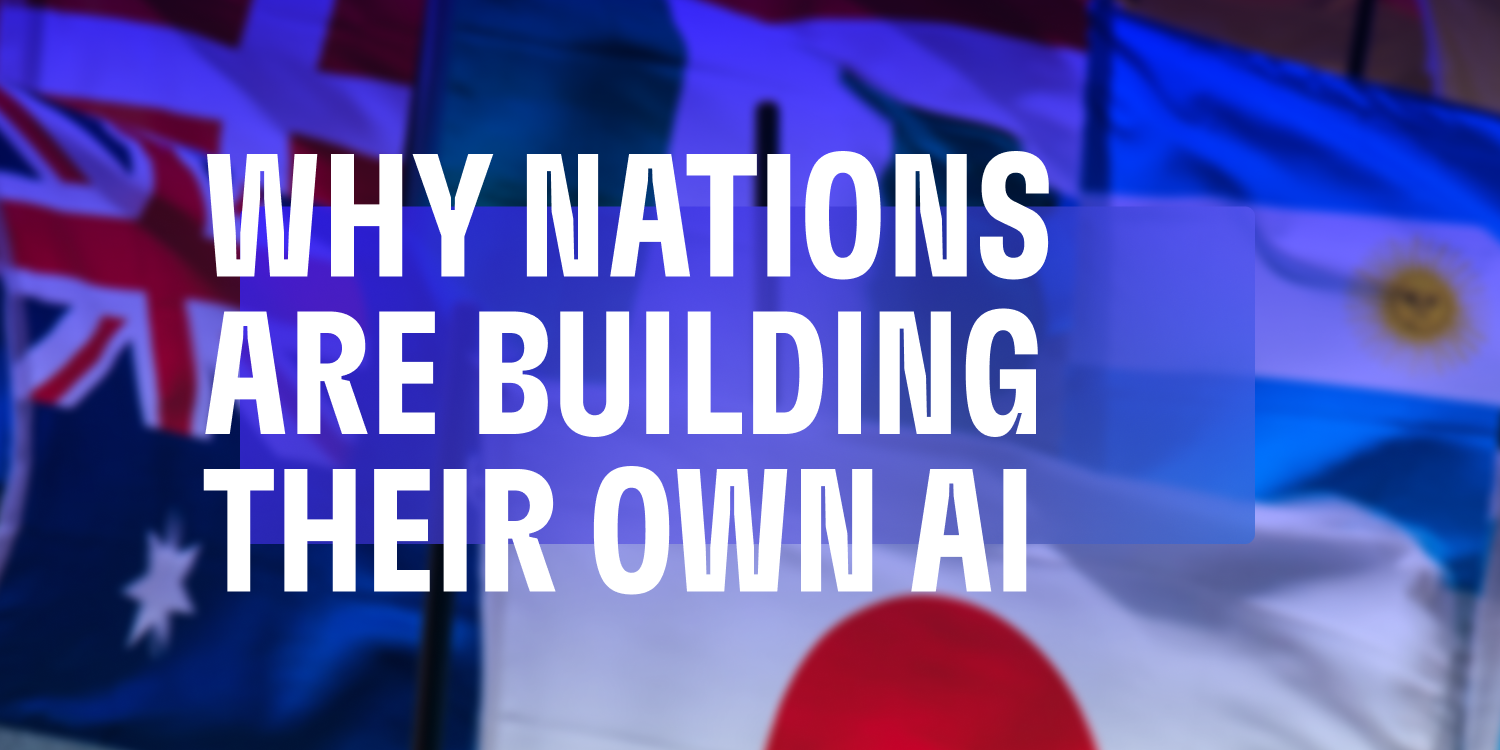
AI's Role In Streamlining Your Personal Budget
How to make financial management a breeze 🍃
This is some text inside of a div block with Cleo CTA
CTASigning up takes 2 minutes. Scan this QR code to send the app to your phone.

At the World Government Summit in Dubai, Jensen Huang, the CEO of Nvidia remarked that every country would want to build their own soverign AI system. Here's a quick look as to why that might be the case and which countries are already building their own AI models.

AI companies based in Europe and the United States are seizing headlines, but the technology is taking off around the globe.
Nvidia CEO Jensen Huang recently stressed that every country must develop its own artificial intelligence infrastructure to leverage economic potential while preserving cultural identity.
Many countries are already investing heavily in AI. For instance, China's ERNIE Bot has garnered a user base exceeding 100 million, while Sberbank, a Russian lender, has introduced GigaChat, aiming to rival ChatGPT in its capabilities.
"You cannot allow that to be done by other people," Huang said at the World Government Summit in Dubai. “The rest of it is really up to you to take initiative, activate your industry, build the infrastructure, as fast as you can."
There are obvious reasons why a sovereign nation would want to have their own model. The most obvious being national security. Relying on foreign AI systems could introduce dependencies and vulnerabilities into critical areas.
A second key reason would be to better capitalize on the economic tailwinds created by AI. Any nationl eading in AI development will foster new industries, improve productivity, and gain significant competitive advantage in the global marketplace.

But in his World Government Summit appearance, Huang cites a third and more nuanced rationale for a national AI program - cultural preservation. For a country, owning their own data, “it codifies your culture, your society’s intelligence, your common sense, your history…”
The United States is still the elephant in the room, investing $47.4 billion in 2022 alone, but Western Europe is latching onto the idea of “digital sovereignty” in the AI sphere.
Silo AI, headquartered in Helsinki and known as Europe's largest private AI lab, recently announced the completion of its Poro model training. The company is part of an initiative focused on crafting a series of open-source, multilingual LLMs.
“In addition to compute access totaling approximately 15 million GPU hours, the initiative is dedicated to ensure that data utilized in these models accurately represent European languages, also covering the English-speaking world,” the company wrote on its website. “The initiative is conducted in close collaboration with key European institutions and agencies, and is committed to adhering to European regulations.”
France is also a standout here– recently promising an additional €500m for AI development. Their most notable AI project, Mistral, is helping set the standard for open source AI and recently raised an eye-watering $113M seed round.
Unsurprisingly, China is betting big on AI as well. The nation's strategic aim to become a global AI leader by 2030 has spurred a wide array of initiatives, from government-backed policies to the surge of innovative startups and tech giants venturing deeply into AI research and applications.
According to a report by the AI-centric research firm Zhidongxi, China led the world in funding generative AI start-ups in the first half of 2023. Out of 51 such start-ups globally, 22 were based in China, collectively raising approximately US$13.8 billion in investments during this time frame.
This week, Moonshot AI, a Chinese artificial intelligence start-up, secured over US $1 billion in its latest funding round. The e-commerce powerhouse Alibaba Group Holding and the venture capital firm HongShan spearheaded the financial boost. The investment showcases the continued keen interest from investors in pioneering Chinese companies on par with OpenAI, the creator of ChatGPT.
Other AI investments are already taking hold in China. Following government approval, Chinese powerhouse Baidu officially introduced its chatbot, Ernie Bot. The bot supposedly gained 1 million users in just the first 19 hours after it was launched. Baidu also introduced a marketplace for Ernie Bot add-ons.
The Chinese government's role in AI development is substantial, offering a mix of policy support and financial incentives to foster technological advancements.
While this approach has indeed accelerated growth, it also raises questions about surveillance and the broader societal impacts of rapid AI integration. Areas such as natural language processing, autonomous driving, and robotics have seen notable innovations, leading to their application across various domains like healthcare, education, and urban management.
The Russian government has placed a high priority on AI, designating it as a critical pillar of the country's development strategy.
The Kremlin's plan is not just to enhance Russia's proficiency in AI but also to carve out a prominent position on the global stage.
This effort is marked by substantial investments in AI research and a push for the development of indigenous technologies to diminish the dependency on foreign software and hardware.
The defense and security sectors are at the forefront of Russia's AI initiatives as the country advances in creating sophisticated autonomous weapons and surveillance systems. Such concentration on military applications of AI has ignited international discussions, drawing attention to the potential dual uses of AI technology and its possible repercussions on global security.
Moreover, Russia's application of AI extends beyond military purposes, targeting the improvement of public services and healthcare systems. In metropolitan areas like Moscow, AI is being utilized to manage traffic flow and enhance public safety measures.
Additionally, the healthcare sector is witnessing the introduction of AI-powered diagnostic tools, aimed at elevating the quality of care provided to patients.
Despite President Putin's 2017 assertion that leadership in artificial intelligence (AI) could establish global dominance, Russia trails behind global competitors like the USA and China in AI development, according to the authors one study.
Russia's unique strategy for AI advancement is led by state-owned entities rather than the private sector or government directly, with Sberbank, a state-owned bank, spearheading the development and investment plans in the absence of major tech firms like Yandex and defense conglomerate Rostec's focus on other technologies.

How to make financial management a breeze 🍃

This year, our company’s superstar experts have been making guest appearances all over the globe to share insights and demonstrate our knowledge in AI and financial health. In case you missed it, here’s some highlights you’ll definitely want to dig into

A quick run down for the non-techies about how we use AI

